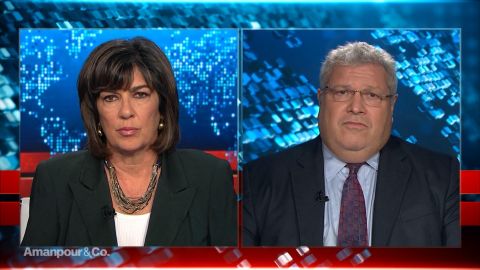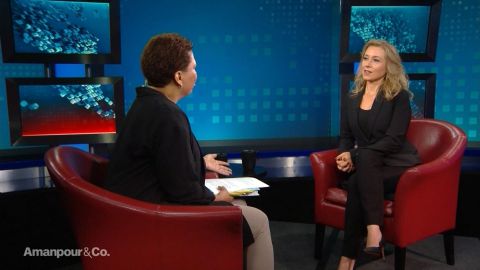Read Transcript EXPAND
MICHEL MARTIN: Sarah Smarsh, thank you so much for speaking with us.
SARAH SMARSH, AUTHOR, HEARTLAND: Thanks so much for having me.
MARTIN: When did you realize that your story was a story?
SMARSH: I really sensed as a kid, a budding writer even at a very young age, that I was surrounded by a cast of kind of wild characters. So I think I felt drawn to writing about my own family just as an inquisitive kid in the context of a culture where people didn’t do a lot of reflecting or talking about themselves. But it wasn’t until I was older and went to college, did some work as a journalist that I understood the ways in which my family’s private story might be worth telling for public reasons.
MARTIN: One of the things about your book that stands out is that you really highlight the stories of women and their particular struggles and their hopes and to the degree that they articulated their hopes. I was going to ask you if you would kind of just describe each one for me as briefly as you could.
SMARSH: Sure. Dorothy is my maternal great-grandmother. She’s no longer living but was vivacious, you know, sassy, Midwestern broad basically and worked in the airplane factories in Wichita which calls itself the Air Capital of the World during World War II. And at that same time, while she was living a very hardscrabble life, she had a daughter named Betty who ended up being one of my primary caretakers. And definitely followed in her mother’s and father’s footsteps as a member of the working poor of this country. She lived a particularly chaotic life even within the context of poverty which often begets chaos and —
MARTIN: She’s married a bunch of times?
SMARSH: Married a bunch of times. If anyone’s counting. And so Betty, my maternal grandmother, this chaos of her life had everything to do in some ways with her gender. So you’re talking about the importance of female stories within, you know, the tales that we tell about poverty. One of the reasons she married so many times was she had fled an abusive husband for her own survival and my mother’s survival. And her second child was essentially kept from her by a small town guy who knew the cops in town and she was told that if she wanted to ever get custody of her son back, she needed to show she had a stable home and a provider which meant being married. So she was shamed in the court process for being intentionally a divorced very young woman with a kid. And so she would take that advice and sometimes marry unsavory characters for the immediate purpose of trying to get her son back. But through all of the hardship that’s documented in the book, her humor and dignity, and just raw power is something that I was in awe of even as a little kid. And people focus I think on the downside of poverty but often within that experience, there is beauty and she was one piece of that.
MARTIN: And your mom?
SMARSH: Jeannie got pregnant with me when she was 17 and Betty also have been a teen mother and I’m the child of generations of teen pregnancy actually. And for that reason, perhaps among others, my mom Jeannie was extremely frustrated and had a hard time as a very young mother out in a rural area. There’s geographic isolation on top of the economic struggles that she was facing as the wife of a construction worker and farmer. She worked all along too when she could but she had her kids in 1980 myself and 1984 so this was before the Family and Medical Leave Act. And so whatever, you know, job that she had when she needed to go have a baby, she lost. And she was a brilliant woman, just a talented artist, and was great with a turn of phrase. And, you know, she represents to me somebody who — she and I have a lot in common in disposition and maybe just professionally inclinations. But her life played out so differently in some ways because of those early pregnancies.
MARTIN: One of the things that you talked about in the book that I found really moving was about the emotional toll of being poor. You said I was the proverbial teen pregnancy, my very existence, the mark of poverty. I was in a poor girl’s lining like a penny in a purse, not worth much according to the economy but kept in production. It’s heartbreaking. How early did you start to kind of make the connection between the fact that your existence changed your mom’s life but you understood how she felt?
SMARSH: I think I was tapped into my mother’s frustration at a very early age. And I understood that you know, she didn’t intend ever to have me. And while there was a man’s love within her, these realities and forces that were at work in her life meant that you know, the children that she ended up raising, you know, had everything to do with the woes of her economic station. So what I understand now is that what I perceived as a very private experience was actually the result of public policies and realities and forces that she as an individual could hardly contend with, knowing a life that she herself survived, it’s kind of a miracle that she even just like kept going and kept us fed.
MARTIN: All the women in your family had babies young and that really did set the course of their lives. And you determined at a really young age that you weren’t going to. And I wonder how you figured that out.
SMARSH: The best I can answer that is I was just a very hyper-vigilant child which is can be, you know, just a psychological feature of any kid who is in a chaotic or even abusive environment. A lot of substances going around in my family, a lot of alcohol, and these things require a child to be kind of standing in an environment. And what I understood was that there were these patterns that were the same about so many people in my family, the teenage pregnancy, they’re not finishing high school, the addiction to something or another. And all I could figure was well I love these folks and I want to carry their strengths with me in the world. If I want some of the outcomes of my life to look different, then maybe those patterns I see, I should do the other thing.
MARTIN: I get the sense that wanting to tell their stories is part of what drove you is. Is that right?
SMARSH: I think it probably at the most personal sense and that’s, you know, where the passion that would drive such a project comes from, was a sense that I know who these people are and I know who I am and yet when I see our place or our demographic, our piece of the United States represented in movies or television or books or even the news media that I’m proud to be a part of, so rarely gets it right. And, in fact, often gets it wrong with insult by which I mean caricature stereotypes even perhaps by well-intentioned storytellers. And feeling that goals between the integrity and dignity and complexity of the people I knew and the stories that were being told about this, I guess as just someone who was going to end up telling stories, that’s why that’s the one that became so important to me to provide maybe kind of a corrective I guess.
MARTIN: You talk a lot about shame. You said in the United States, the shaming of the poor is a unique form of bigotry that’s not necessarily about who or what you are, your skin color, the gender you’re attracted to, having a woman rather, it’s about what your actions have failed to accomplish, financial success within capitalism, and the related implications about your worth and the supposed meritocracy. You say that poor whiteness is a peculiar offense in that society and views whiteness with power. And so how did that occur to you?
SMARSH: It is a fact that whiteness is a privilege in many ways, including economic in this country. And because of that, sometimes — let’s say when I was that first generation kid on a college campus, people who saw me perhaps for their ideas about what poverty manner represented, my own disadvantage was kind of physically invisible to them.
MARTIN: When you were in college, did people know you were poor or at least thought you were poor? Did you feel poor?
SMARSH: You know, when I was a kid I never would have used that word and I didn’t feel it. I thought, you know, when I was raised, you usually got enough to eat, a roof over the head, no complains. College, when I started, you know, brushing up against kids from very different backgrounds, like damn, I really had to like work a lot harder to get here and nobody bought me a car for high school graduation. And I’ve got three jobs just to pay the bills. They’re having the time of their life and these are the hardest years of my life and they were.
MARTIN: You feel like you made it?
SMARSH: You know, the day that I graduated from high school, when I’m being the first person from my farmhouse to do so, I remember at that moment and I think I might even write about this thinking, I’m not pregnant and I graduated from high school, I made it.
MARTIN: What do you want to happen as a result of your book?
SMARSH: What I hope is kind of twofold I guess, that on one side of the coin, that the people who feel like someone hasn’t told their story will read the book and be able to say like that flatland and that wheat field and that female body, that’s where I’m from. And then on the other side of that coin, that the people for whom the class and place and experience that I tried to document might feel utterly foreign that that reader could perhaps both have her eyes opened to some reality that she hadn’t previously known. And I won’t sell my younger self-short by saying I didn’t work darn hard because I did. But, you know, when I’m here to say is not I made it, then why can’t you? You should too. It’s to say I made it. I guess. So what I’m here to say is most people will not because it’s almost impossible and it shouldn’t be and it doesn’t have to be. And as the subtitle of my book says, the richest country on earth.
MARTIN: Sarah Smarsh, thank you so much for talking with us.
SMARSH: Thanks for having me. This was great.
About This Episode EXPAND
Christiane Amanpour interviews John Avlon, CNN Senior Political Analyst and former Chief Speechwriter for NYC Mayor Rudy Giuliani & Patti Solis Doyle, former Senior Advisor to Hillary Clinton; and Robert Kagan, author of “The Jungle Grows Back” and former U.S. Assistant Secretary of State. Michel Martin interviews Sarah Smarsh, author of “Heartland.”
LEARN MORE


